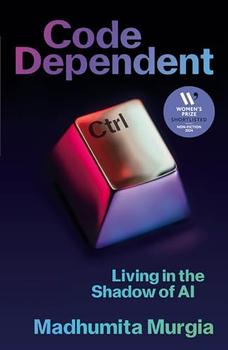
Living in the Shadow of AI
by Madhumita Murgia
A riveting story of what it means to be human in a world changed by artificial intelligence, revealing the perils and inequities of our growing reliance on automated decision-making.
On the surface, a British poet, an UberEats courier in Pittsburgh, an Indian doctor, and a Chinese activist in exile have nothing in common. But they are in fact linked by a profound common experience―unexpected encounters with artificial intelligence. In Code Dependent , Murgia shows how automated systems are reshaping our lives all over the world, from technology that marks children as future criminals, to an app that is helping to give diagnoses to a remote tribal community.
AI has already infiltrated our day-to-day, through language-generating chatbots like ChatGPT and social media. But it's also affecting us in more insidious ways. It touches everything from our interpersonal relationships, to our kids' education, work, finances, public services, and even our human rights.
By highlighting the voices of ordinary people in places far removed from the cozy enclave of Silicon Valley, Code Dependent explores the impact of a set of powerful, flawed, and often-exploitative technologies on individuals, communities, and our wider society. Murgia exposes how AI can strip away our collective and individual sense of agency, and shatter our illusion of free will.
The ways in which algorithms and their effects are governed over the coming years will profoundly impact us all. Yet we can't agree on a common path forward. We cannot decide what preferences and morals we want to encode in these entities―or what controls we may want to impose on them. And thus, we are collectively relinquishing our moral authority to machines.
In Code Dependent , Murgia not only sheds light on this chilling phenomenon, but also charts a path of resistance. AI is already changing what it means to be human, in ways large and small, and Murgia reveals what could happen if we fail to reclaim our humanity.
"In this mordant debut exposé, Financial Times editor Murgia goes into the global trenches where artificial intelligence is being rolled out and finds a proliferation of lousy jobs, impenetrable red tape, grotesque misogyny, and tyrannical surveillance...The result is a biting and skeptical look at the brave new world of AI." —Publishers Weekly (starred review)
"Murgia has consciously reached beyond Silicon Valley to focus on the 'global precariat,' a strategy that is valuable in its own humanizing right and also drives home how thoroughly implicated the developed world is in the continuing harms endured by the developing one. Throughout, the author writes with clarity and compassion in equal measure. A fascinating, sobering, wide-ranging examination." —Kirkus Reviews (starred review)
"Exposes the hidden consequences of our existing AI technologies." —The Times (UK)
"A penetrating look at how we're allowing artificial intelligence to infiltrate all parts of society, from policing, welfare, justice and health, to the point where whole lives are being altered – often ruined – by systems that hardly any of us understand." —The Daily Telegraph (UK)
"The power of this book lies in the rich stories it tells of individuals ... Drawing on interviews from around the globe, this highly readable and deeply important book exposes AI's sordid underbelly." —The Guardian (UK)
This information about Code Dependent was first featured
in "The BookBrowse Review" - BookBrowse's membership magazine, and in our weekly "Publishing This Week" newsletter. Publication information is for the USA, and (unless stated otherwise) represents the first print edition. The reviews are necessarily limited to those that were available to us ahead of publication. If you are the publisher or author and feel that they do not properly reflect the range of media opinion now available, send us a message with the mainstream reviews that you would like to see added.
Any "Author Information" displayed below reflects the author's biography at the time this particular book was published.
Madhumita Murgia is the Artificial Intelligence Editor for the Financial Times. Raised in Mumbai, she studied biology at Oxford before joining the Oxford team working on an AIDS vaccine, and then moved into writing by way of a science journalism MA at New York University and a first job at WIRED magazine. She joined the Financial Times eight years ago where, alongside breaking front-page stories, she's focused on the human impact of emerging trends in technology.




There is no science without fancy and no art without fact
Click Here to find out who said this, as well as discovering other famous literary quotes!
Your guide toexceptional books
BookBrowse seeks out and recommends the best in contemporary fiction and nonfiction—books that not only engage and entertain but also deepen our understanding of ourselves and the world around us.